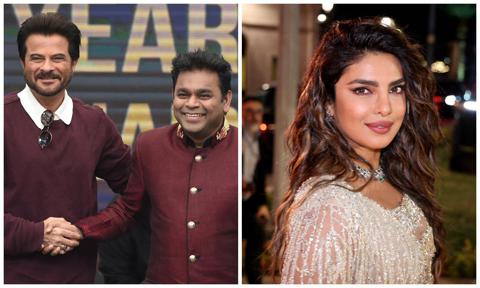
The Oscars is one of the biggest nights in Hollywood, a night where the best of the best gather to celebrate the year’s most outstanding achievements in film. And for the Indian film industry, it’s a chance to showcase our talent and compete on a global stage.
Come Sunday, Indian cinema is launching one of its biggest offensives ever at the Academy Awards. ‘Naatu Naatu’ from S.S. Rajamouli’s RRR is up for Best Original Song; it won the Golden Globe, to frenzied jubilation everywhere, two months ago. Meanwhile, two documentaries—Shaunak Sen’s feature-length All That Breathes and Kartiki Gonsalves’s 41-minute The Elephant Whisperers—are in with a shout in their respective categories. It really does look like our year, with celebrations planned and congratulatory posts drafted out in advance. The cinephile excitement is at a peak, so what more could we want?
One answer is Deepika Padukone. Last week, Oscar enthusiasm hit the roof when it was announced that Padukone, after unveiling the FIFA World Cup Trophy in Qatar in 2022 and being on a jury at the Cannes Film Festival, will present an Academy Award alongside the likes of Riz Ahmed, Dwayne Johnson, Emily Blunt and Samuel L. Jackson.
Padukone will be part of a double treat for Indians watching with sleepy eyes on Monday morning, with MM Keeravaani conducting a 2.5-minute ‘Naatu Naatu’ piece on stage (sadly, no Ram Charan and Jr. NTR to lead the dancers; they’ll be in attendance with director SS Rajamouli).
Over the years, Indians have made their mark at the Oscars, whether it’s through nominations, wins, or even presenting at the ceremony. So, let’s take a look back at all the times Indians attended, won, were nominated, or presented at the Oscars.
The First Indian Nominee
The year was 1983, and the Academy Awards were about to make history. Indian filmmaker Satyajit Ray was nominated for Best Foreign Language Film for his film, The Home and the World, making him the first Indian filmmaker to receive an Academy Award nomination. Though he didn’t win, this nomination paved the way for future Indian filmmakers to be recognised at the Oscars.
By the early 1990s, the Academy had honoured world cinema giants like Akira Kurosawa, Jean Renoir, Charlie Chaplin and Orson Welles. Now came Satyajit Ray’s turn. In March 1992 Ray was ailing in his hospital bed in Kolkata and could not attend the Oscars ceremony in LA. Audrey Hepburn was presenting his Academy Honorary Award on stage. Holding his golden statuette, in a beige embroidered panjabi, Ray joined via a video-feed and spoke of the influence of American cinema in his life. Despite his failing health (he passed away less than a month later), the master was calm, eloquent and funny—a tonality of televised award shows he understood too well.
Bhanu Athaiya Wins for Costume Design
In 1983, Bhanu Athaiya became the first Indian to win an Oscar, for her work on Richard Attenborough’s epic Gandhi. Athaiya won for Best Costume Design, along with John Mollo, and her historic win opened doors for Indian artists and filmmakers at the Academy Awards.
Chiranjeevi Becomes Guest Of Honour
In 1987, Chiranjeevi became the first South Indian actor to be guest of honour at the Oscars; two years later, Mira Nair’s Salaam Bombay! was nominated. The new millennium saw Aamir Khan hobnobbing with Julia Roberts and Denzel Washington on the red carpet. His Lagaan was a big deal (ultimately losing out to Bosnian war drama No Man’s Land), but it was Slumdog Millionaire, eight years later, that really kicked down the doors.
Music Maestro Rahman Takes Home Two Oscars
A. R. Rahman, the music maestro who has composed some of the most memorable soundtracks in Indian cinema, made history at the 81st Academy Awards in 2009. Rahman was nominated for two awards that night, Best Original Score and Best Original Song, for his work on the film Slumdog Millionaire. And he won both! His wins were a major moment of pride for Indians everywhere, as he became the first Indian to win two Oscars in one night.
Reminiscent of Naatu Naatu’s success, ‘Jai Ho’ was already a globally downloaded sensation when it won the Oscar for Best Original Song—one of eight the film took home that year. Though a British production, and suitably problematic for its view of urban poverty in India, Danny Boyle’s film turned the Oscars into a joyous Bollywood night. A.R. Rahman, Gulzar and Resul Pookutty won awards, with Rahman winning two. Particularly touching was the final tableau during the Best Picture win—Anil Kapoor beaming, Irrfan Khan struggling to tuck in his cuffs, Dev Patel picking child actor Rubina Ali Qureshi in his arms. A typically Indian assembly, with a bunch of foreigners thrown in.
Resul Pookutty’s Oscar-Winning Sound Design
Another major win for India came in 2009, when sound designer Resul Pookutty made history by winning the Oscar for Best Sound Mixing for his work on Danny Boyle’s Slumdog Millionaire. Pookutty’s win was particularly significant, as he was the first Indian to win in this category. He shared the award with Ian Tapp and Richard Pryke, and his win brought attention to the contribution of Indian technicians and artists in Hollywood.
A Rousing Performance by the Slumdog Millionaire Team
At the 81st Academy Awards, A.R Rahman not only took home several Oscars, but also gave a memorable performance of the film’s hit song Jai Ho’ at the Oscars After Party. The performance was a vibrant celebration of Indian culture and a moment of pride for Indians around the world.
Life of Pi Wins Four Oscars
Ang Lee’s Life of Pi, based on the novel by Yann Martel, won four Oscars in 2013, including Best Director for Lee. Indians played a major role in the making of the film, with Tabu and Irrfan Khan appearing in key roles and Pookutty winning a nomination for Best Sound Editing.
Documentary Short Subject Nominations and Wins
While Indian feature films have made a mark at the Oscars, Indian documentary filmmakers have also been recognized for their work. Several Indian documentary shorts have been nominated and even won at the Oscars over the years, including Period. End of Sentence, which won the Best Documentary Short Subject in 2019. The film, which deals with menstrual hygiene in rural India, was produced by Indian producer Guneet Monga and put a spotlight on important social issues in the country.
Priyanka Chopra and Other Indian Presenters
Over the years, a few Indian actors have had the honour of presenting at the Oscars. Persis Khambatta made history by becoming the first Indian person to ever present at the Academy Awards. She appeared on stage at the prestigious award event in 1980. Born in Mumbai to a Parsi family, Khambatta was an actor and model best remembered for playing Lieutenant Ilia in 1979’s Star Trek: The Motion Picture.
After Persis, Priyanka Chopra was the one to do the honours at the 88th Academy Awards in 2016. She was a presenter at the ceremony with Steve Carell, Jared Leto, Julianne Moore, Olivia Munn, Margot Robbie, Jason Segel, Andy Serkis, Kerry Washington and Reese Witherspoon. Chopra, particularly, has displayed an internationalism characteristic of the 21st century Asian crossover star. Now Padukone is poised to do the same. It’s a shiny year for India at the Academy Awards. If a win marks the occasion, there will be nothing like it. Other Indian presenters have included Anil Kapoor, Freida Pinto, and Dev Patel.
Representation and the Road Ahead
Historically, Indians, and Indian movies, have been thinly represented at the Oscars. In a span of 94 years, we’ve won six times (the number is marginally improved if you include the technical achievement awards). On the face of it, this shouldn’t be too depressing; the Oscars remain a predominantly American bash. Yet the Academy—a 9000-plus-members honorary body that gives out the awards—has been pushing for increased diversity, and includes many Indians. And, on a more pedestrian level, if there’s one country as frantically obsessed with red carpets, flashy performances and celebrity jamborees as the US—the difference, perhaps, is only one of prestige—it’s probably India.
The international success of films like Slumdog Millionaire, Life of Pi, RRR, as well as the attention brought to important social issues by films like Period. End of Sentence, are important steps towards greater representation and visibility for Indians in the entertainment industry, and we definitely seem to be on the right path.






